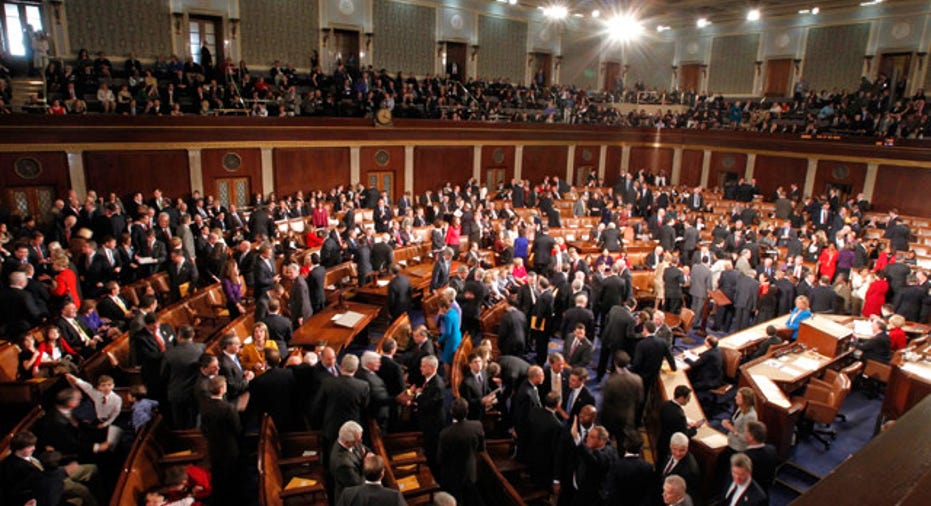Wall Street Wants Substance From Trump's Congressional Address

President Donald Trump has promised to make America great again, now Wall Street wants to know how.
Investors will be closely eyeing the president’s first address to a joint session of Congress Tuesday night for details of his economic-growth plan. Following a meeting with state governors on Monday, Trump said his administration will move “very, very quickly” on easing regulatory burdens, and plans to submit a budget to Congress next month focused on public safety and national security.
Details were scant, but the president said the budget would include “a historic increase” in defense spending aimed at ramping up U.S. military capabilities, more spending on federal law enforcement, and an economic agenda that includes a “major” tax reduction. Trump also promised to deliver a “big statement” on infrastructure during his speech.
“What’s important is that there is more fleshed out along the lines of what kind of regulatory reform we can expect, and the tax code is a big thing. Every policy description has been encapsulated in a single adjective…there’s been very little in the way of true detail,” said Tom Siomades, head of Hartford Funds Investment Consulting Group.
Specifically, Siomades said he’s looking for more clarity not just on regulatory reform and how the administration will take down and rebuild components of the Affordable Care Act, but also how Trump’s plans to bolster the defense department will impact investment in weapons systems and contractors, or where the government will be looking to the private sector to help with the construction of the controversial Mexico/U.S. border wall.
“He can’t afford to have an Oscar moment. He needs to be very specific and not confusing at all,” Siomades said.
Indeed, Deutsche Bank economists expect the president to spend most of his speech time focused on tax reform since it’s a crucial element of his plan to kick start America’s growth engine. The better the economy, the higher the approval ratings (and perhaps stock market) for U.S. presidents – which will likely equate to more political clout in Washington.
“Individual tax reform could be passed by June. Is this aggressive? No – Bush signed his tax cut into effect in June,” the team of economists led by Joe Lavorgna said while also noting that corporate tax reform could be tied into infrastructure spending where there’s already bipartisan support.
The avenue where tax talks could get sticky is with the floated controversial and more complex Border Adjustment Tax (BAT). While Deutsche Bank sees it providing a vehicle for cutting U.S. corporate tax rates from 35% to 20%, and making the U.S. more competitive globally by offering less incentive to pursue inversions (and more to move headquarters back to American shores), the economists don’t expect Trump to mention the effort specifically on Tuesday night.
“We expect President Trump to simply set the table for what should be a long and drawn out negotiation on how to achieve needed tax reform,” they said.
As Wall Street focuses on the president’s 2017 roadmap, it does so with stocks sitting at record levels, looking for any reason to move higher. The Dow Jones Industrial Average on Monday saw its 12-consecutive record high – a streak not seen since 1987.
Even if Trump delivers the policy speech investors say they want to hear, risks still lurk in the global landscape, including a presidential election in France that some say could be as disruptive as last year’s Brexit vote, continued unrest in the Middle East, or a disruption in the South China Sea.
“All of that can happen in the blink of an eye. You’re more apt to have risk going forward…what you really want to be cognizant of right now is you have an incredibly idyllic cocktail of things being incredibly placid,” said Siomades. “[Today] needs to be the start of something because we’ve floated along…we need something to come out of this White House that we can finally get a grip on that we haven’t so far.



















